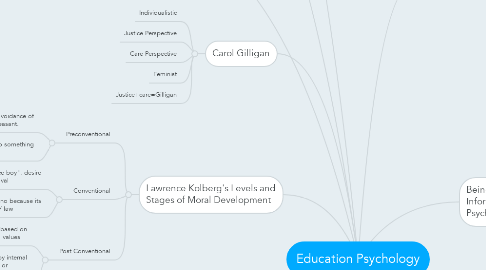
1. Lev Vygotsky
1.1. Three Assumptions
1.1.1. Role of Language
1.1.2. Social and Cultural
1.1.3. Developmental Trajectory
1.1.3.1. Zone of Proximal Development: Learning that a student can achieve if guided by an adult or teacher.
1.1.3.2. Scaffolding: The guidance a student needs to learn. Grows with the student
2. Urie Bronfenbrenner
2.1. Bioecological Theory: Focuses on the social contexts in which students live.
2.1.1. Five Ecological Systems
2.1.1.1. Microsystem: Directly interact ex. family school work etc
2.1.1.2. Mesosystem: Links microsystems
2.1.1.3. Exosystem: student is affected but has no control E. govt, mass media, school board
2.1.1.4. Macrosystem: The larger social and cultural context ex. culture, small town Alberta, religious
2.1.1.5. Chronosystem: Time and place
3. Erikson's Stages of Human Development
3.1. Trust vs. Mistrust
3.2. Autonomy vs. Shame & Doubt
3.3. Initiative vs. Guilt
3.4. Industry vs Inferiority
3.5. Identity vs. Identity Confusion
3.6. Intimacy vs. Isolation
3.7. Generativity vs Self Absorbtion
3.8. Integrity vs. Dispare
4. Lawrence Kolberg's Levels and Stages of Moral Development
4.1. Preconventional
4.1.1. a) Punishment: avoidance of something unpleasant.
4.1.2. b) Hedonism: do something out of pleasure
4.2. Conventional
4.2.1. c)"Nice girl/ Nice boy": desire for social approval
4.2.2. d) Law & Order: no because its against the rules/ law
4.3. Post Conventional
4.3.1. e) Social Contract: based on internal beliefs and values
4.3.2. f) Universal/Ethical: people led by internal morals regardless of taboo, law or consequence
5. IQ Testing and Children
5.1. Definition: simple way to describe intelligence by assigning a number that represents the ratio of mental age to chronological age times 100.
5.2. Standard Curve
5.3. Myths
5.3.1. Mysterious Quality
5.3.2. Only thing worth Knowing about someone
5.3.3. Do not change (they do)
5.4. Truth
5.4.1. IQ score correlated with academic success
6. Carol Gilligan
6.1. Individualistic
6.2. Justice Perspective
6.3. Care Perspective
6.4. Feminist
6.5. Justice+care=Gilligan
7. Gardeners 10 MI's
7.1. Visual/spatial
7.2. Mathmatical
7.3. Natural
7.4. Existential
7.5. Spiritual
7.6. Interpersonal
7.7. Intrapersonal
7.8. Musical
7.9. Verbal
7.10. Bodily/kinesthetic
8. Diversities
8.1. Socioeconomic Status (SES)
8.2. Cultural Capital
8.3. Reduce Barriers
8.4. Multicultural Education
9. Principals of Effective Teaching
9.1. Social & Ethical Matters
9.2. Multicultural Students
9.3. Subject Matter Competence
9.4. Professional Skills
9.4.1. Instructional Strategies
9.4.2. Goal Setting & Instructional Planning
9.4.3. Classroom Management
9.4.4. Motivational Skills
9.4.5. Communication Skills
9.4.6. Technology Skills
9.4.7. Working with Students with Diverse Backgrounds
9.5. Commitment
9.6. Professional Development
9.6.1. Positive Professional Identity
9.6.2. Seek Advice from Competent Experienced Teachers
9.6.3. Embrace Life-Long Learning
9.6.4. Build up Resources and Support
10. Being A Wise Consumer of Information About Education Psychology
10.1. Be cautious of what is represented in the popular media
10.2. Avoid drawing conclusions about an individual based on group research
10.3. Recognize how easy it is to generalize about a small or clinical sample
10.4. A single study is not the defining word
10.5. Consider the source of the information and it's credibilty
11. Jean Piaget
11.1. Cognative Processes
11.1.1. Schema:A concept or framework to organize experiences and information.
11.1.1.1. Assimilation: New information fits unobtrusively into the existing schema.
11.1.1.2. Accommodation: information does not fit unobtrusively and schema must be changed or rearranged so it fits.
11.2. Four Stages of Cognitive Development
11.2.1. Sensorimotor (birth-2yrs)
11.2.1.1. interact with their environment through senses and movement.
11.2.2. Pre-operational (2-7 yrs)
11.2.2.1. Beginning of symbolic thinking
11.2.2.2. Intuitive thinking
11.2.2.3. Egocentrism: they are at the centre of their old, don't know that people think differently.
11.2.3. Concrete Operational (7-11 yrs)
11.2.3.1. Child can preform operational thinking (mental operations that are systematic and therefore reversible)
11.2.3.2. Conservation: appearance of liquid may change but there is no change in volume.
11.2.3.3. seriation: Child can arrange objects into series
11.2.3.4. Transitivity: Children can infer about operations and come up with conclusions based on logic (A>B, B>C Therefore A>C)
11.2.4. Formal Operational (11-15+ years)
11.2.4.1. abstract thinking
11.2.4.2. Hypothetical Deductive reasoning: syllogism: man, mortal.
12. Videos
12.1. Allison Cameron
12.1.1. "Brain Gain": Students do better in school when they have 20 mins of rigorous exercize.
12.2. Shawn Anchor
12.2.1. "Positive Psychology: the Science of Happieness": Harvard, can improve tasks by 50% by just being happy before you do it.
12.3. Simon Sinek
12.3.1. "How Great Leadership inspires Action": Its not what you do but why you do it"
12.4. Richard St. Johns
12.4.1. 8 Secrets of success
12.5. Malcolm Gladewell
12.5.1. Anyone can be successful because success is determined by hard work and culture
12.6. William Ury
12.6.1. The walk from no to yes: the secret to peace is us and seeing things from the 3rd side, the outside perspective
12.7. Ken Robinson
12.7.1. "Do schools kill creativity"
12.8. Derek Sivers
12.8.1. "How to Start a movement"
12.9. John Hunter
12.9.1. Teaching with the world peace game

